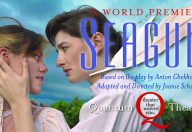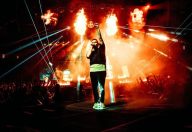‘Eye in the Sky’: A Combination of Classic Film Techniques and Modern Warfare
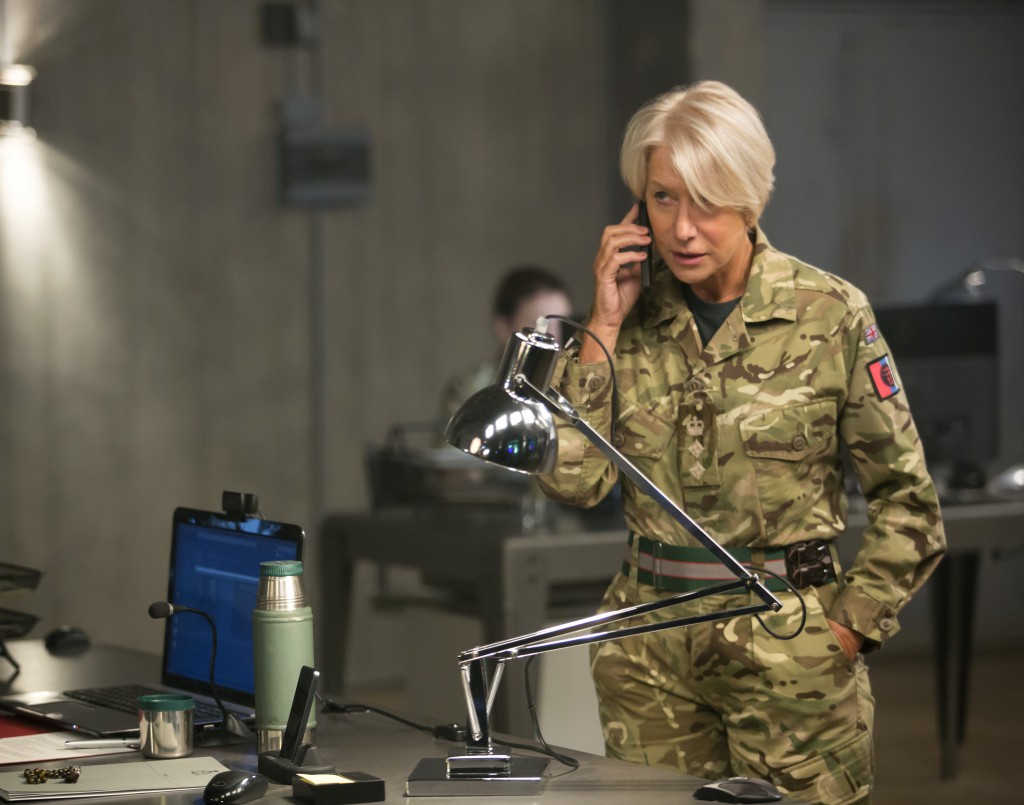
Helen Mirren stars as Colonel Katherine Powell in the dramatic thriller ‘Eye in the Sky,’ a Bleecker Street release.
photo: Keith Bernstein/Bleeker Street.
You’re probably unlikely to find a bigger fan of legendary film director Alfred Hitchcock than yours truly. In a career spanning over 50 years Hitchcock made more than 50 feature-length films, 11 of which can be counted as masterpieces. (Personal favorites include The 39 Steps, Notorious, Shadow of a Doubt, Rear Window, North by Northwest, and Psycho.) Even with some of his lesser works, (The Lodger, Rope, Spellbound, Lifeboat) he was always moving the art of film forward. And you will still find, inside even the complete misfires (Torn Curtain, Topaz, Marnie) moments of visible genius. I bring all that up so that when I tell you that Eye in the Sky, a new film from Gavin Hood, puts me in mind of Hitchcock, you’ll understand what praise that is.
No matter how grisly the tale (Psycho, Frenzy) he never considered himself a “horror” director and would often illustrate the difference between that sort of film with his chosen milieu, the “thriller.”
He’d describe a scene featuring two men at a table talking about nothing for a few minutes. Then the camera would cut to a bomb under the table just as it explodes; that, he explained, was merely shocking. But he’d then imagine the same scene only this time the camera reveals the bomb under the table before the men sit down. There would follow the exact same boring conversation only now—with occasional cuts to the ticking bomb—their talk becomes almost painfully tense; that is a thriller and that’s what Hitch did better than anyone else.
From such a simple, fundamental idea Hood has crafted this incredibly tense and relentlessly paced military thriller, informed by issues currently blazoned across the headlines. With monomaniacal focus, Hood shows us the bomb, arranges the table, seats the men and sets them to talking—leaving the audience both enthralled by and helpless to stop the onrushing explosion.
The film begins slowly; we meet Helen Mirren waking up early in the morning at her house in England. We learn that she’s Colonel Katherine Powell of the British Armed Services who heads a multi-national military effort to capture terrorists in Kenya. Hopping over to an airbase in Nevada, we’re introduced to Aaron Paul and Phoebe Fox as pilots who, from an air-conditioned box in the American dessert, “fly” the drones carrying cameras and payload over the African continent.
In Kenya we meet up with a young girl, Alia, played by Aisha Takow. She and her parents live in an area of Nairobi controlled by members of Al-Shabaab, a militant Islamist organization. Under their rigid rules, she and her family lead simple lives; her father fixes machinery and her mother bakes bread which Alia sells at a table in the marketplace.
We’re then eaves-dropping on a special meeting of British military and political figures which includes Alan Rickman (in his last live-action role) as Lt, General Frank Benson and Jeremy Northam playing an assistant to the British Foreign Secretary.
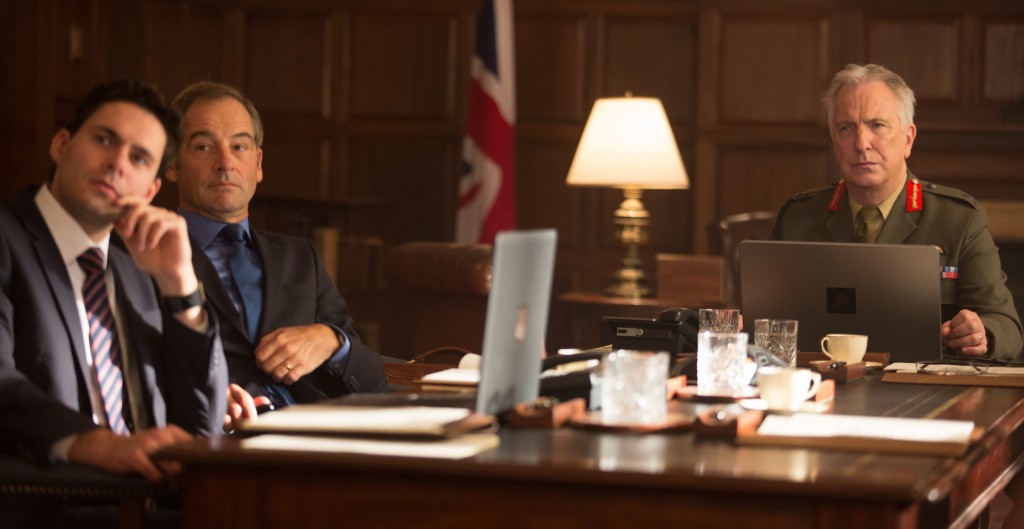
(Left to Right) Francis Chouler as Jack Cleary, Jeremy Northam as Brian Woodale, and Alan Rickman as Lt. General Frank Benson in Gavin Hood’s ‘Eye in the Sky.’ photo: Keith Bernstein/Bleeker Street.
Then it’s back to Nairobi to meet Barkhad Abdi as a member of the Kenyan Army. He is part of a surveillance unit posted near a private residence which serves as a safe house for Al-Shabaab terrorists.
It transpires that on this day three Al-Shabaab leaders will be meeting in the house. The mission is for the Kenyan army, with the help of British and American military intelligence, to capture the leaders—until they discover that the three are there to send two young members out into the streets wearing jackets with enough explosives for each of them to take out a city block. And now begins a scramble to have the political and military higher-ups sign off on raising the mission from “capture” to “kill.”
There is, however, a major complication—Alia and her bread. She’s selling it on the other side of the wall of the compound enclosing the house with the terrorists that’s about to be blown to bits from a missile fired from the drone controlled by the pilots in Nevada on the order of the British colonel once she gets the general’s go ahead who needs permission from the Foreign Secretary desperate to get agreement from his American counterpart. Will Alia become “collateral damage” and, if so, who in that long, interwoven chain is responsible?
Hood and co-screenwriter Guy Hibbert are extremely methodical introducing their characters and filling in the particulars of the scenario … and once that’s established the movie unfolds in real-time as events transpire according to predetermined logic.
The Table is Set
Just as Hitchcock, having shown the bomb under the table, doesn’t need to do anything else to build the tension, Hood is smart enough to know all the heavy lifting’s been done in the set-up and once this ball gets rolling he doesn’t need to add anything else. That maybe makes it sound like what he’s doing in the second half is easier that what he’s done in the first, but sometimes just staying out of your own way and having faith in your ability is the hardest job of all.
He’s avoided those traps and Eye in the Sky is a taunt, tension-filled, briskly intelligent piece of filmmaking and, like people say, you will be on the edge of your seat the entire time.
Hats off, too, to a cast smart enough to realize their work is one piece of a large, intricate puzzle; this is true ensemble acting … everyone working towards the common goal. There are no stand-outs, the entire company plays at the same level with the same intent (a testament to Hood’s ability to guide actors.) But, of course, I do want/need to mention that work like this makes the loss of Rickman that much more painful.
Food for Thought
I admit a big reason for my enjoyment of this film is being swept away by the cinematic skill and talents of Hood and company—but I’d be remiss not talking about the content as well.
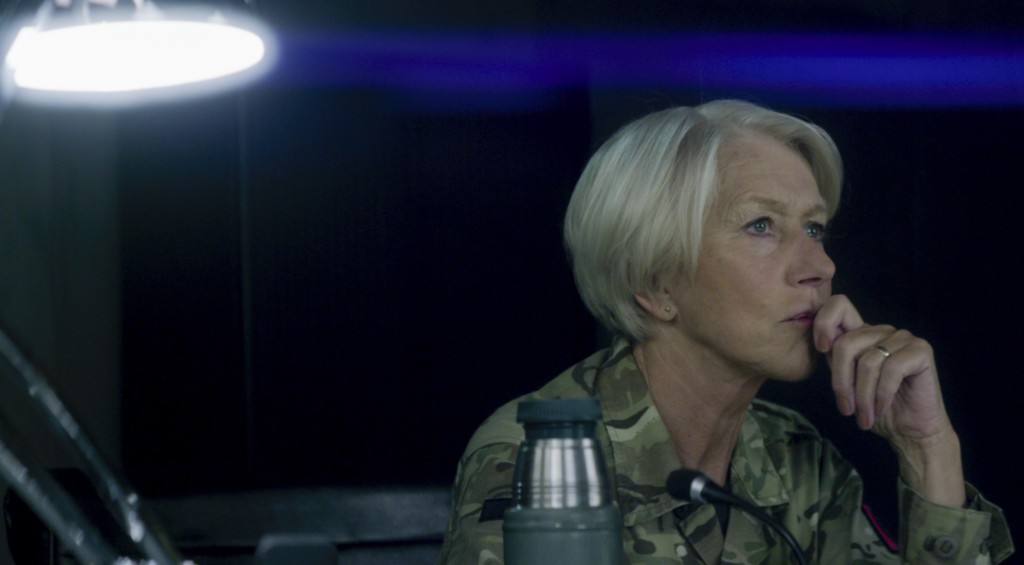
Helem Mirren contemplating her next move.
Eye in the Sky is terrifically concerned with huge issues, all about horrible foreseen and unforeseen consequences: The ethical dilemma of drone warfare and killing people as though it were a video game as well as asking if the disaster of political cowardice is better or worse than the danger of political sword rattling. Eye in the Sky explores how sanitizing the public perception of war’s horrors has warped our understanding of the cost and suggests that the mechanization and merchandising of killing blinds us to the loss of humanity at the root of any conflict.
I do want to be clear though that Eye in the Sky is not some 1960’s hangover bit of anti-war agitprop. Hood makes very clear the murderous intent of the terrorists and the huge suffering and misery caused by their distorted ideology; these people are the epitome of evil and we must do what we can to save the lives they’re so eager to destroy.
But the film forces us to consider that saying “well, at least we’re not as bad as the enemy” might not be enough—do the terrorists win if we trash our values in pursuit of them? And there’s the saddest and most frustrating question—have the steps we’ve taken to eliminate these horrible people only become a recruitment tool to create new enemies?
When so much Hollywood output these days makes violence and death a consequence-free occurrence, Eye in the Sky forces us to think.
How Hood’s managed to accomplish that, while turning out such a top-notch thriller, is a small miracle.
Ted Hoover is a Pittsburgh-based writer and critic.
Share on Social Media
Follow Entertainment Central
Latest Stories
Sign up for the EC Newsletter






